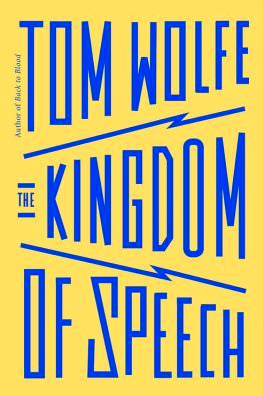The Kingdom of Speech
By Will Horner, Contributing Editor
Aha! seems to be Tom Wolfe’s archetypical cry in understanding the basis of the world, how and where we fit in it. Following many of the tropes seen in The Painted Word, Wolfe turns from art theory to evolution in The Kingdom of Speech, focusing again on the fabled, no-way-around-it word, or in this case speech, a most-esteemed factor in how humans developed separate from the world of plants and animals. While it may not be as trendy a topic as gallivanting hippies or adrenaline-happy rocket jockeys, the reader is slung around in space-time for Wolfe to come upon the reason, the real reason we talk and how it shapes us from on the branches to below the street lamps.
The essential thing that drives the book is the understanding of everything, the encompassing theory of all theories, the origin of the species. Like in his book on art criticism, The Painted Word, Wolfe includes himself very much into the story, which he evades in his more notable works like The Electric Kool-Aid Acid Test or The Right Stuff. Starting with the discovery of nothing by Noam Chomsky and a few other MIT professors, “. . . the origins and evolution of our linguistic capacity remain as mysterious as ever,” to which he replies from the largely used “Aha!” to the more archaic, “Ahura!” Wolfe begins to construct an argument, beginning in the 1800s, with Charles Darwin, cozy in his stuffy hypochondria in London, and his relationship with Alfred Wallace (who’s that?), a then-contemporary naturalist, in the mud, living amongst nature, competing for the pedestal for their scientific findings. Wolfe notes Wallace’s attempts and snubs from the Linnean Society, an academic biological society, to present what essentially becomes Darwin’s argument. The reader follows Darwin in his attempts at Everything, largely resting on the realm of language, how speech reflects the world and us in it.
Fast-forward to the 1950s: Noam Chomsky, the prodigy thinker, the law of the land of linguistics. Chomsky presents his law of recurrence, which explains the brain’s mythical language center for “universal grammar,” only to come across another rival, marking about in the Amazon. Daniel Everett (come again?), a contemporary to Chomsky, then unhinges Chomsky’s theory by simply saying, “This group of people over here, the Pirahã, they don’t follow this universal theory, Chomsters. They don’t even have a grasp of the future or the past, only the now, the now!”
Only by Wolfe’s perseverance in looking at these two bloodless conflicts does he come to his own conclusion that speech is “a mnemonic system,” a way for us to pattern our speech pattern, to remember, to organize, to pull from nature the invisible to make artifacts out of. “Speech,” Wolfe states, “and only speech, gives the human beast the ability to make plans . . . not just long-term plans, but any plans, even for something to do in five minutes.” Speech also gives us the ability to tell time, to measure, to build, to investigate, to express, to create. What Wolfe gives us is the keys to understanding, or at least a lock pick for our eyes to see what line divides the microcosms of biology and even the general macrocosm of Earth. It’s the problem we’ve been largely expediting to religion, whether we are made or we just are, whether we have free will or not, dualist versus dialectic thought. This heavily-researched yet short book is a blanket-explanation of what academics have been turning in bed for, why speech is so fundamental in our lives.
It’s definitely a book to pass along to friends, but moreso for the topic and its presentation. Wolfe has a great intuition in research and stringing along occurrences in history, and showing us something that we didn’t know, delving into a world that we as a general public probably thought was settled. The reader is left with not an open-ended question but a way of thinking of their own collected cell-cess pool that we call the body, that we call human.
William Horner is a continuing senior at Columbia College Chicago. He has no job, no wife/husband/pet or a shitty jay nay say quay. He eats too much and hasn’t been published. What a maroon.
August 14, 2017

